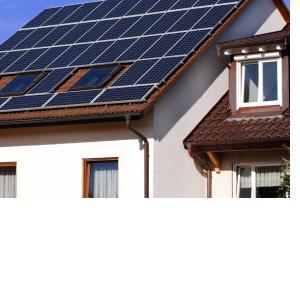
Exactly what is energy efficiency? The phrase is tossed out frequently in association with buildings, products and activities but it often means different things to different people.
Simply put, energy efficiency refers to using less energy for the same or higher performance. It is typically associated with products, buildings and systems that use or require energy. Energy efficiency is also considered to be an effective way to reduce greenhouse gas emissions. By cutting down on the energy our society needs to grow and develop, we can reduce the amount of greenhouse gas emissions that contribute to global warming.
According to the International Energy Agency, an international energy policy advisory, energy efficient buildings, industrial processes and transportation could reduce the world's energy needs by one third, and play a critical role in controlling global emissions of greenhouse gases. While energy efficiency has become a very popular topic in recent years, energy efficient strategies have been discussed since the energy crisis in the 1970s. Back then, the state of California took the lead and today still has some of the strictest energy requirements in the country.
Energy Efficient Homes
What is energy efficiency in relation to a home? Insulating a house is one example. Insulation inside the walls of your home will result in less heat and air conditioning needed to maintain comfortable interior temperatures. Installing solar and photovoltaic panels to decrease your electrical consumption is another example of energy efficiency in the home. Energy efficient light bulbs and fixtures have come down in price and are becoming prevalent in many homes.
Energy efficient appliances are another way to "green" a home. In recent years, manufacturers have improved goods such as refrigerators, freezers, dishwashers, clothes washers and dryers, to use much less energy. Even the standard bathroom appliances have gotten smarter. Low flow toilets are considered energy efficient because they use less water per flush.
Energy Efficient Buildings
Commercial building owners are realizing that owning and operating energy efficient buildings will not only help the planet, it will help their bottom line. The U.S. Green Building Council's popular LEED program (Leadership in Energy and Environmental Design), has helped raise awareness about the benefits of energy efficient buildings. It has also created a roadmap for designing and refurbishing environmentally-friendly buildings.
Some efficient building practices include:
- green roofs that not only reduce energy consumption but also improve storm water management and preserve green space.
- windows made with electro chromic glass that adjusts to control solar heat gain.
- green cleaning practices that use low water and chemical free maintenance programs
- building management systems that monitor light and power requirements in different zones of a large building.
Energy Efficient Cars
What is energy efficiency in relation to automobiles? Hybrids are not the only energy efficient cars on the market. Alternative fuel cars reduce gasoline consumption by substituting gas for biodiesel, electricity, ethanol, natural gas, or propane. Electric vehicles and hydrogen powered cars produce no exhaust or emissions. Finally, drivers are getting smarter, in general, about maintaining their cars, keeping air in their tires, and driving the speed limit in order to achieve energy efficiency, no matter what kind of vehicle they drive.
More Information: What is Energy Efficiency?
Following are some resources on the Web to learn more about energy efficiency:
- US Department of Energy
- EnergySavers.com, the Department of Energy's consumer site
- International Energy Association
- U.S. Green Build Council
- The Environmental Protection Agency's Energy Star Program
- The Alliance to Save Energy
Finding out more about energy efficiency can help save money as well as be kinder to the planet.







